Yesterday Google announced that they will shut down Google Reader July 1st. In a way this announcement didn’t surprise me, as my own use of RSS readers has gone down in favor of news readers such as Flipboard and using Twitter as a discovery tool.
Front Matter
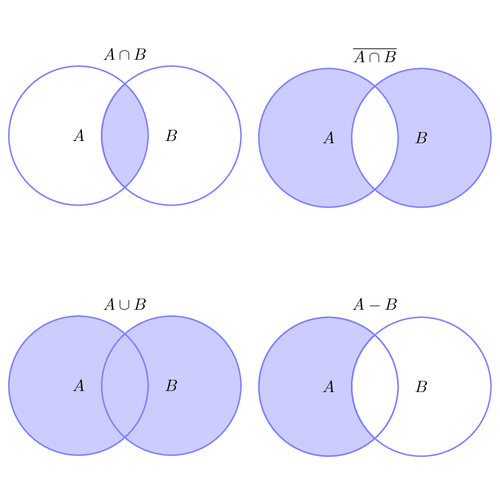
Following up from my post last week, below is a suggested list of features that should be supported in documents written in scholarly markdown. Please provide feedback via the comments, or by editing the Wiki version I have set up here. Listed are features that go beyond the standard markdown syntax.
Markdown is a lightweight markup language, originally created by John Gruber for writing content for the web. Other popular lightweight markup languages are Textile and Mediawiki. Whereas Mediawiki markup is of course popular thanks to the ubiquitous Wikipedia, Markdown seems to have gained momentum among scholars.
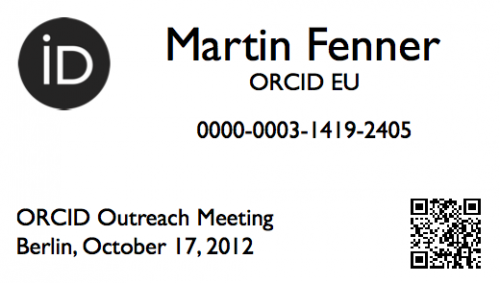
Last week has been busy. I went to Berlin for the launch of the Open Researcher & Contributor ID (ORCID) service. ORCID allows researchers to obtain a persistent identifier that can be used to claim publications and other scholarly works.
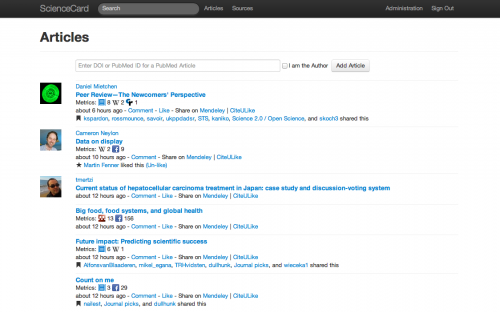
Almost exactly a year ago (in the hackathon of the Science Online London 2011 conference) I started the ScienceCard project. ScienceCard is a fork of the Open Source PLOS Article-Level Metrics (ALM) code, personalizing the Article-Level Metrics. A lot has happened in the last 12 months, most importantly that I started to work for PLOS as technical lead for the Article-Level Metrics project in May.

The science blogging network Nature Network is moving to a new home. Today SciLogs.com launched as a new home for Nature Network bloggers. I have been blogging at Nature Network for three years, starting with my first blog post (Open access may become mandatory for NIH-funded research) almost exactly 5 years ago to the day. My blog moved to PLOS BLOGS in September 2010 and all my old Nature Network content can be found here at PLOS BLOGS.
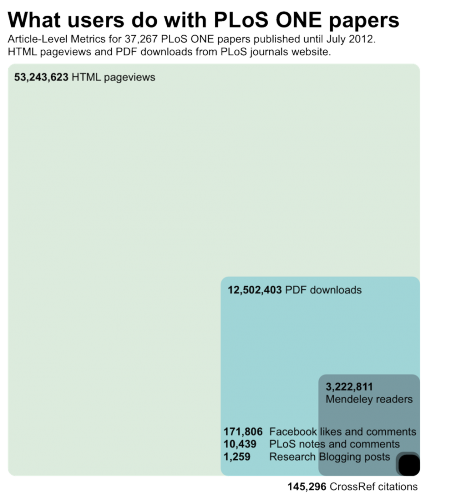
Inspired by four recent blog posts and their comments (Comments at journal websites: just turn them off, Open Access and The Dramatic Growth of PLoS ONE, No Comment?, If you email it, they will comment), I created a graphic to show what users do with PLoS ONE papers. As always, the data behind the graphic are openly available.
Earlier this week the European Commission announced new measures towards open science. As part of the announcement interviews of three scientists with European Commission Vice President Neelie Kroes were posted on YouTube.
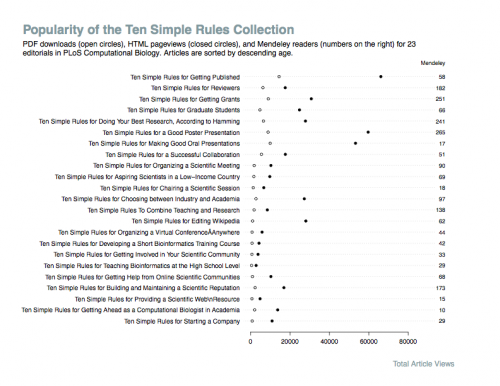
This has been another week working on visualizations. I have summarised some of the results in a blog post over at the PLoS API website. One of my current favorites is the dot chart. PLoS Computational Biology publishes a collection of Ten Simple Rules. The dot chart below summarizes the HTML pageviews, PDF downloads and Mendeley readers for this collection.
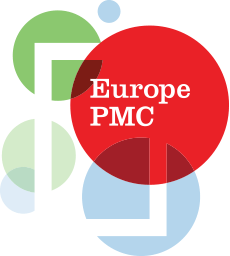
The European Research Council on Friday announced that they will participate in the UK PubMed Central (UKPMC) open access repository service. They become the third European funder to join UKPMC, and the existing UKPMC funders have agreed to rebrand UKPMC as Europe PubMed Central (abbreviated to EPMC?) on November 1st. More information about these changes can be found on the UKPMC blog and in the Wellcome Trust press release.

DNA Barcoding the Native Flowering Plants and Conifers of Wales has been one of the most popular new PLoS ONE papers in June. In the paper Natasha de Vere et al. describe a DNA barcode resource that covers the 1143 native Welsh flowering plants and conifers. My new job as technical lead for the PLoS Article Level Metrics (ALM) project involves thinking about how we can best display the ALM collected for this and other papers.